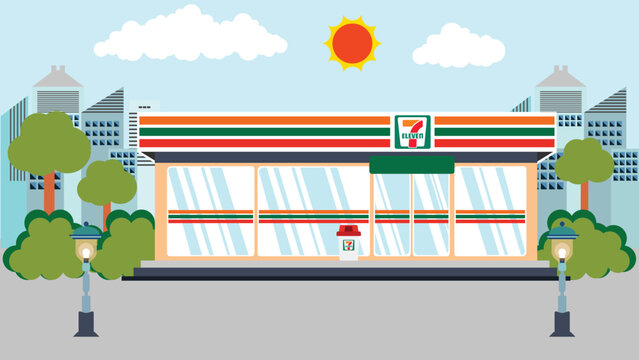The convenience store industry is witnessing a potential game-changing move as Couche-Tard, a Canadian retail giant, has made a bold attempt to acquire the $31 billion owner of 7-Eleven, Seven & I Holdings. This would mark the largest-ever attempted foreign takeover of a Japanese company, signaling Couche-Tard’s aggressive expansion strategy and its determination to solidify its position as a global leader in the convenience store market.
Background on Couche-Tard and Its Growth Strategy
Couche-Tard, headquartered in Laval, Quebec, is one of the largest convenience store chains in the world, with over 14,000 stores across North America, Europe, and Asia. The company operates under various banners, including Circle K, Ingo, and Mac’s. Couche-Tard has a history of rapid expansion through strategic acquisitions, including its purchase of Circle K in 2003, which propelled the company into the global market.
The company’s growth strategy has been focused on expanding its footprint in key markets, particularly in the United States, where the convenience store sector is highly competitive. By acquiring 7-Eleven, Couche-Tard aims to further consolidate its presence in the U.S. market while gaining a foothold in Japan, a market known for its high retail density and advanced convenience store culture.
Significance of 7-Eleven and Seven & I Holdings
7-Eleven is one of the most recognizable convenience store brands globally, with over 70,000 locations in 17 countries. The chain is particularly dominant in Japan, where it accounts for more than 20,000 stores. Owned by Seven & I Holdings, a Japanese retail conglomerate, 7-Eleven is a crucial part of the company’s business, contributing significantly to its revenue.
Seven & I Holdings also operates other retail businesses, including department stores, supermarkets, and financial services. However, 7-Eleven remains the crown jewel in its portfolio, making it an attractive target for acquisition by foreign companies looking to enter the lucrative convenience store market in Japan and expand their global reach.
The Offer: Couche-Tard’s Ambitious Bid
According to reports from Japan’s Nikkei newspaper, Couche-Tard has made an offer to acquire Seven & I Holdings, which would include the ownership of 7-Eleven. The proposed deal, valued at $31 billion, represents a significant premium over Seven & I’s current market capitalization. This bold move is part of Couche-Tard’s strategy to expand its convenience store empire and strengthen its position in the global retail market.
The offer is not just a financial transaction; it is a statement of intent. Couche-Tard is signaling its ambition to become a dominant player in the global convenience store industry. If successful, the acquisition would not only give Couche-Tard control over the 7-Eleven brand but also access to Seven & I’s extensive retail network in Japan and other key markets.
While the potential acquisition presents numerous opportunities, it also comes with significant challenges. One of the biggest hurdles Couche-Tard may face is gaining approval from Japanese regulators, who are often cautious about foreign takeovers of domestic companies, particularly in strategic industries like retail. The deal would likely be subject to rigorous scrutiny to ensure it aligns with Japan’s national interests.
Another challenge is the integration of Seven & I Holdings into Couche-Tard’s existing operations. The cultural and operational differences between the two companies could pose obstacles to a smooth merger. Couche-Tard would need to navigate these complexities carefully to ensure the success of the acquisition and the continued growth of the 7-Eleven brand.
On the other hand, the acquisition also presents significant opportunities for Couche-Tard. By gaining control of 7-Eleven, the company would be able to leverage the brand’s global recognition and extensive retail network to further expand its reach. Additionally, the acquisition would allow Couche-Tard to tap into Japan’s advanced retail technology and consumer trends, which could be applied to its operations in other markets.
Impression
If the acquisition goes through, it would have far-reaching implications for the convenience store industry. Couche-Tard’s consolidation of 7-Eleven would create a global retail giant with unparalleled market reach and influence. This could lead to increased competition in the convenience store sector, particularly in the United States, where both Couche-Tard and 7-Eleven have a significant presence.
The deal could also trigger a wave of mergers and acquisitions in the retail industry, as other companies look to compete with the newly formed retail behemoth. Smaller convenience store chains may seek to merge or be acquired to stay competitive, while larger players may explore new markets or diversify their offerings to differentiate themselves.
For consumers, the acquisition could result in more streamlined operations and improved convenience store offerings. Couche-Tard has a track record of enhancing the customer experience through innovation and efficiency, and it is likely that these practices would be extended to 7-Eleven stores under its ownership.
From a strategic perspective, the acquisition of Seven & I Holdings and 7-Eleven would represent a major milestone in Couche-Tard’s growth journey. The company has been steadily expanding its global footprint through acquisitions, and this deal would significantly accelerate that process. By gaining control of one of the world’s most recognized convenience store brands, Couche-Tard would solidify its position as a leader in the industry.
Furthermore, the acquisition would provide Couche-Tard with valuable insights into the Japanese market, which is known for its high retail density and consumer demand for convenience. This knowledge could be applied to other markets, helping Couche-Tard stay ahead of the competition and continue its growth trajectory.
Couche-Tard’s attempt to acquire Seven & I Holdings and 7-Eleven is a bold move that could reshape the convenience store industry on a global scale. While the deal presents significant challenges, particularly in terms of regulatory approval and integration, it also offers substantial opportunities for growth and innovation.
If successful, the acquisition would position Couche-Tard as a dominant player in the global retail market, with the potential to set new standards for convenience stores worldwide. As the industry continues to evolve, this deal could serve as a catalyst for further consolidation and innovation, ultimately benefiting consumers and shaping the future of retail.
No comments yet.








